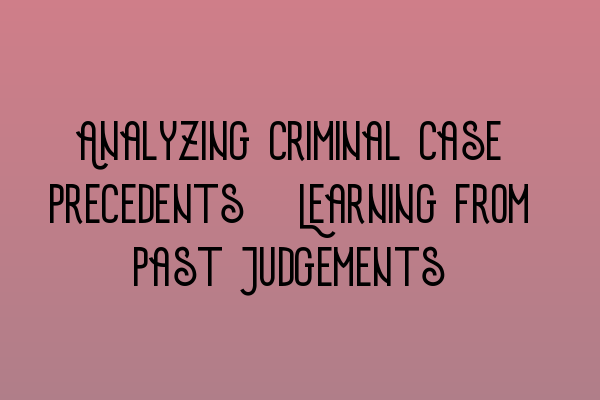Analyzing Criminal Case Precedents: Learning from Past Judgements
Welcome to the SQE Criminal Law & Practice blog! In today’s post, we will be diving into the importance of analyzing criminal case precedents and how they can serve as valuable learning resources for legal professionals. By understanding and studying past judgments, we can gain insights into legal reasoning, strategic arguments, and successful defense tactics. Let’s explore this topic in detail.
The Significance of Criminal Case Precedents
Criminal case precedents, also known as legal precedents or case law, refer to the judgments and decisions made by courts in past criminal cases. These judgments form a body of legal principles that help guide and shape future cases with similar circumstances. They serve as valuable references for legal professionals, providing a framework for interpreting laws, understanding legal doctrines, and building persuasive arguments.
Studying criminal case precedents allows lawyers and solicitors to analyze the reasoning behind court decisions, examine the application of statutes, and identify patterns in judicial interpretations. It helps to establish a solid foundation for legal arguments, providing a persuasive basis for advocating on behalf of clients.
Learning from Past Judgements
One of the key benefits of analyzing criminal case precedents is the opportunity to learn from past judgements and improve legal skills. By closely examining successful defense strategies or arguments that led to favorable outcomes, aspiring solicitors can gain valuable insights into effective legal approaches.
For example, let’s consider a case involving a complex fraud accusation. By studying past judgments in similar fraud cases, solicitors can identify winning arguments, relevant case authorities, and legal theories that have proven successful in defending clients. This analytical approach allows legal professionals to enhance their ability to construct strong defenses and deliver favorable outcomes.
Maximizing the Use of Criminal Case Precedents
To truly harness the benefits of criminal case precedents, legal professionals should adopt a systematic approach to their analysis. Here are some key steps to consider:
- Research: Use reliable legal databases and resources to access a wide range of criminal case precedents. Familiarize yourself with the facts, legal issues, and outcomes of relevant cases.
- Analyze: Dig deep into the reasoning provided by the courts in their judgments. Understand the legal principles applied and the factors that influenced the decision-making process.
- Compare: Compare and contrast different cases with similar legal issues. Identify common threads, divergent interpretations, and emerging trends.
- Extract: Extract key arguments, legal doctrines, and strategies that were successful in specific cases. Adapting these insights to new scenarios can strengthen your own legal arguments.
By following this systematic approach, legal professionals can extract valuable insights, enhance their legal knowledge, and most importantly, improve their ability to serve their clients.
Related Articles
For further resources relating to SQE criminal law and practice, we recommend the following articles:
- SQE 1 Practice Exam Questions
- SQE 1 Practice Mocks FLK1 FLK2
- SQE 2 Preparation Courses
- SQE 1 Preparation Courses
- SRA SQE Exam Dates
We hope you found this blog post informative and insightful. Analyzing criminal case precedents is a crucial skill for any legal professional, and by utilizing these resources, you can develop a deep understanding of legal principles and strategies. Stay tuned for more helpful content from SQE Criminal Law & Practice Law UK!
